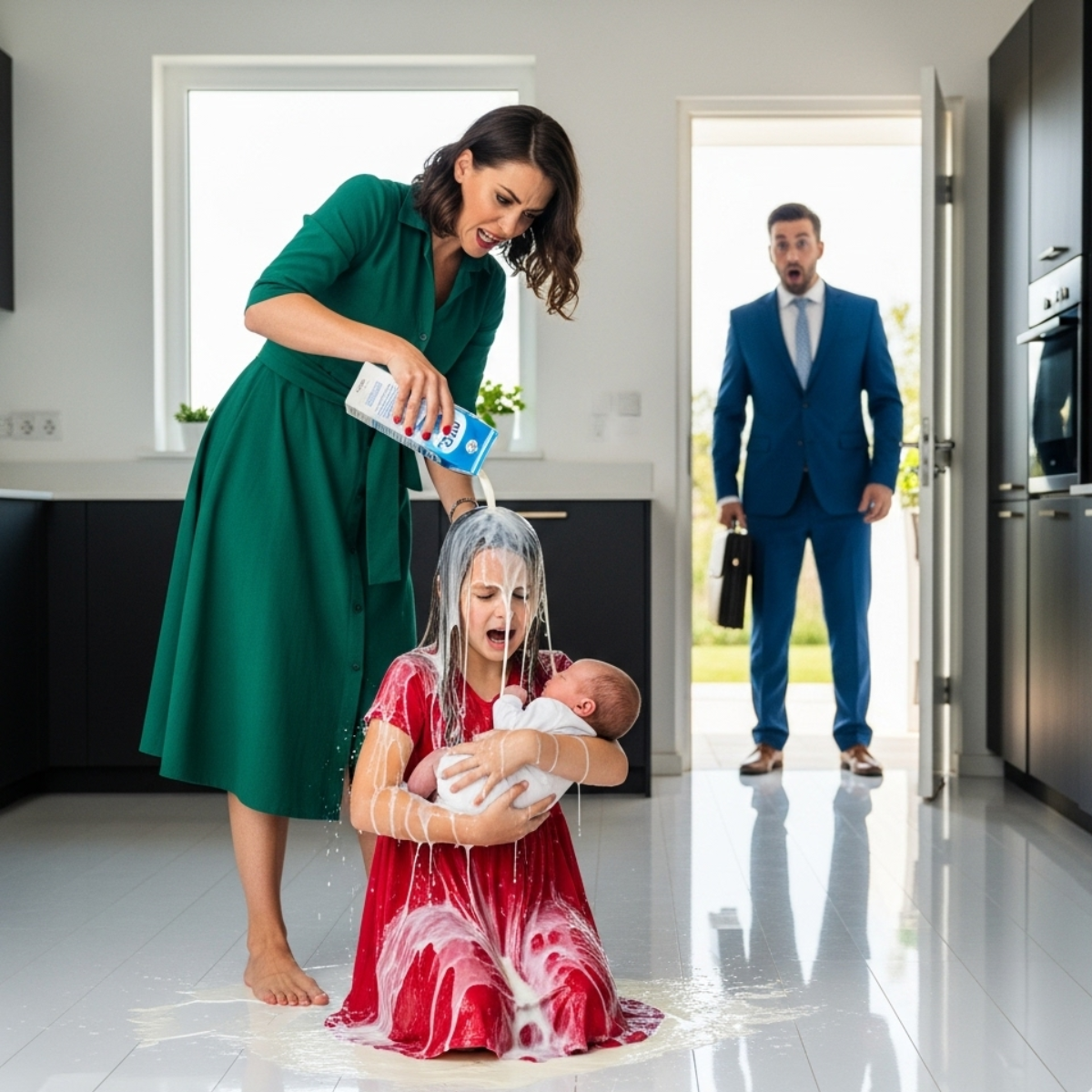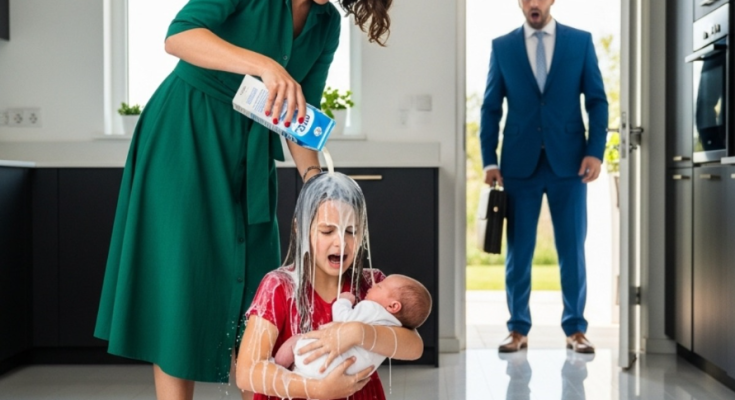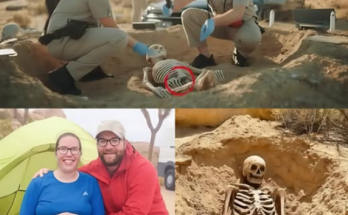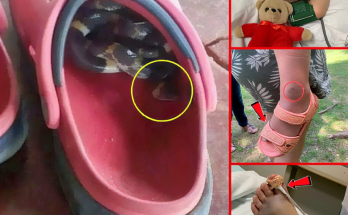Richard Whitman’s heart pounded as the cab eased to a stop in front of his two-story home in suburban Chicago. After three grueling weeks of back-to-back business meetings in London, endless presentations, and jet-lagged nights spent poring over contracts, he was finally home. The city lights outside seemed distant and indifferent compared to the anticipation swelling in his chest.
He imagined the moment he would step through the front door. In his mind, Emily, his bright-eyed seven-year-old daughter, would run toward him with uncontainable joy, shouting “Dad!” Little Alex, barely two, would babble incoherently from his high chair, waving his tiny hands in excitement. And Vanessa, his wife of just two months, would meet him with a warm smile, a soft laugh escaping her lips as she welcomed him back.
These visions had kept him going through the long flights, the endless meetings, the sterile hotel rooms. They were his reason for striving, for enduring the stress and isolation of business life. His family. The very thought of them brought a sense of purpose and warmth he couldn’t find anywhere else.

The taxi stopped, and Richard stepped out with his suitcase in hand. He felt a strange mixture of exhaustion and exhilaration. He looked down at the small parcels he had brought from London—a storybook for Emily, a teddy bear for Alex—and imagined the delight on their faces. The anticipation of laughter, of hugs, of the quiet hum of family life, filled him with a profound sense of relief. Finally, home.
But the moment he inserted his key into the lock, a sharp, piercing sound shattered his expectations. The unmistakable sound of glass breaking echoed through the house. His stomach dropped.
Then—a sob. High-pitched. Fragile. Desperate.
Richard’s chest tightened as he froze in the hallway. Every instinct screamed that something was horribly wrong. He dropped his suitcase and bolted toward the kitchen, each step heavy with dread.
What he saw made him stop dead in his tracks. The scene in front of him was not the happy homecoming he had imagined. Emily sat on the cold tile floor, milk dripping through her hair and soaking her dress, forming a small puddle beneath her. Her arms trembled as she clutched Alex, holding him protectively. She looked small, fragile, and terrified.
Above her stood Vanessa, holding the empty jug as if it were a weapon. Her face was contorted with rage, a flash of something unrecognizable, almost alien, that Richard had never seen in her before.
“Please, Mom… I’m sorry,” Emily whispered in a broken voice.
Richard’s briefcase fell from his hands with a heavy thud. The sound barely registered over the roar of his heart. He was paralyzed, caught between disbelief and horror. Her little girl wasn’t just upset—she was scared. Terrified. And the subtle signs of this were unmistakable; he had missed them, blinded by Vanessa’s charm and their early marital bliss.
“ENOUGH!” he bellowed, his voice echoing through the kitchen, breaking the spell of violence and fear that had gripped the room.
Vanessa froze and slowly turned, forcing a smile that seemed more like a mask than an expression of warmth. “Richard… you came back early… I—”
He didn’t hear her. His eyes were locked on Emily, trembling, clutching her brother. Richard could see the fear in her wide, teary eyes, but also a glimmer of hope—hope that he, her father, would protect her.
Without a moment’s hesitation, he knelt and scooped Alex into one arm, pulling Emily close with the other. He felt her tiny body cling to him, her sobs soaking into his jacket. He felt guilt rise up inside him—guilt for not seeing sooner, for trusting too readily, for thinking money and status could shield his family from pain.
“No more,” he said, his voice low but firm, forged of steel. “Vanessa. Pack your bags. You are leaving this house today.”
Emily clung to him, her small fingers gripping his shirt as if he might vanish too. Each night, she would wake from nightmares, holding Alex close, whispering into the darkness, “Don’t let him come back, Dad.”
And each night, Richard would hold them both, rocking them gently, whispering, “He’s gone, honey. You’re safe. It will never hurt you again.”
The weeks that followed were a revelation. For years, Richard had chased success relentlessly—contracts, investments, meetings, endless travel—believing that financial security equaled happiness. But standing in the kitchen, watching Emily cradle her brother as if he were a tiny adult, he understood the depth of his blindness. Money could never replace the innocence lost, the trust betrayed, or the fear that had haunted his children.

Richard made radical changes. He reduced his working hours, delegated responsibilities, and began coming home earlier. Boardroom discussions were replaced with afternoons in the kitchen. He rolled up his sleeves and cooked with Emily, teaching her how to measure flour, laugh at burnt cookies, and experiment with recipes. Laughter slowly returned to their home. It was tentative at first—a flicker of a smile—but eventually it became full, ringing, joyful, and healing.
Trust, however, could not be rebuilt overnight. Emily would sometimes glance at the door, expecting Vanessa to appear again. Each time, Richard knelt beside her, placing a firm hand on her shoulder, reminding her gently but insistently, “I’m here. You’re safe.”
One quiet afternoon, Richard found Emily by the window, rocking Alex in her lap, humming a lullaby she had learned from her mother before things had turned dark. He sat beside her and asked softly, “Emily, do you hate Vanessa?”
She looked at him with a serenity beyond her years. “No, Dad. I just… don’t want anyone else to get hurt.”
Her words pierced him. There was no resentment, no anger—only wisdom and empathy that seemed far beyond her age. Richard hugged her, pride and embarrassment mingling in his chest, and made a silent vow: he would give them a life filled with safety, love, and joy, a life untainted by fear, but rich in the small moments that truly mattered.
The house slowly transformed. Evenings were no longer filled with tension but with shared meals, laughter, and bedtime stories. Weekends were devoted to parks, museums, and quiet walks. Alex learned to crawl, then walk, under Emily’s watchful, protective gaze. Richard watched them grow, feeling both the ache of lost time and the joy of the present.
And yet, the memory of that day—the day he had shouted “ENOUGH!”—remained etched in his mind. It was a turning point, a moment of clarity. Redemption had begun not with money, not with apologies, but with a single, decisive act: standing up for what truly mattered.
Over time, Emily’s laughter became a constant melody in the house, one that even Richard’s busiest days could not drown out. She learned to trust again, and in doing so, taught him the true meaning of resilience and love. He realized that life’s richness was measured not in contracts signed or bonuses earned, but in the tiny hands that reached for him, the soft voices that whispered, and the unbroken bond of family.
One evening, as the sun dipped behind the Chicago skyline, Richard sat with Emily and Alex on the couch, the two children leaning against him, a blanket draped over their shoulders. He felt a profound sense of peace. The terror, the mistakes, the missed signs—all of it had led to this: a home filled with warmth, laughter, and the healing power of love.
And he never forgot the lesson that had changed everything: that sometimes, the first step toward redemption begins with a single word, shouted with all the strength and clarity one can muster:
“ENOUGH!”
Richard Whitman had finally come home—not just to a house, but to a family, a life, and a truth that no amount of money or success could ever replace. And in that home, he vowed, fear would never rule again.



